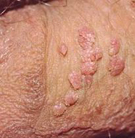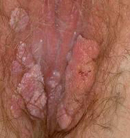
26850 Providence Parkway Suite #300, Novi, MI, 48374
Phone: 248.348.4200
Fax: 248.380.6457

Gavini Pediatric & ADHD Clinics26850 Providence Parkway, Suite 300, Novi, MI 48374 :: 248.348.4200www.ADHDclinic.com :: www.YourKidsDoctor.com |
|
|---|---|
Genital WartsWhat are Genital Warts?A wart is a small growth on the skin that develops when the skin is infected by a virus. Genital warts is a highly contagious sexually transmitted disease caused by some sub-types of human papillomavirus (HPV). It is spread through direct skin-to-skin contact during oral, genital, or anal sex with an infected partner. Warts are the most easily recognized symptom of genital HPV infection. Those infected with genital HPV, it is estimated that only a "small percentage" (between 1% and 5%) develop genital warts, those infected can still transmit the virus. Other types of HPV also cause cervical cancer. There is no cure for the HPV virus, but if genital wart do occur, there are treatments to remove the warts.Gardasil is a series of three vaccines for use in the prevention of certain types of human papillomavirus (HPV). It does not treat existing infection. Therefore, to be effective it must be given before HPV infection occurs. |
|
|
Male Genital Warts Female Genital Warts Signs and SymptomsThe symptoms of genital warts may include:
|
|
CausesYou can get genital warts during oral, vaginal or anal sex with an infected partner.Correct usage of latex condoms greatly reduces, but does not completely eliminate, the risk of catching or spreading HPV. Having sex with a partner whose HPV infection is latent and demonstrates no outward symptoms still leaves one vulnerable to becoming infected. If an individual has unprotected sex with an infected partner, there is a 70% chance that he or she will also become infected. The immune system eventually clears the virus through interleukins, which recruit interferons, which slow viral replication. |
|
TreatmentThe treatment depends on the type of wart. The common treatments are abrasion, cautery with acids and cryo-treatment. There is no cure for HPV, but there are methods to treat visible warts, which could reduce infecting other partners, although there are no trials studying the effectiveness of removing visible warts in reducing transmission.Trichloroacetic acid (TCA): For common warts TCA is an effective treatment because it destroys the proteins in the viral cells. A petroleum jelly will be applied around the healthy skin area of the wart to protect the intact skin. TCA is then applied and is a clear, watery liquid that is painted on the warts with an applicator. The warts will turn a whitish color and shrink. CyroPen: This is the state-of-the-art treatment modality that freezes the wart to -130F and kills the virus. The rods in the Helium cooled devise come in various diameters to suit various wart sizes. The Cryopen rod is applied to the wart 10 seconds to 3 minutes, depending on the thickness and toughness of the lesion. The freezing will cause a blister which may last for 3 to 5 days before it scabs. The scab will fall off within 2 weeks. This skin area will remain light colored for a few months and would completely disappear, leaving no scars. CryoPen advantages are:
|
|

